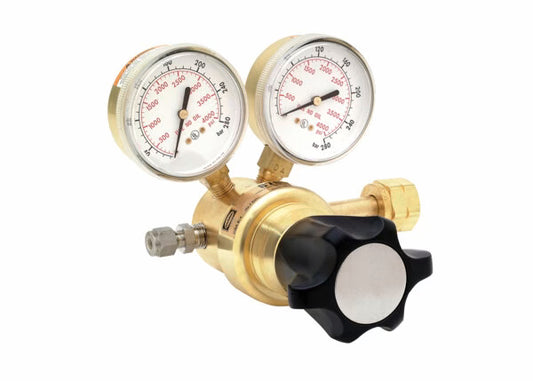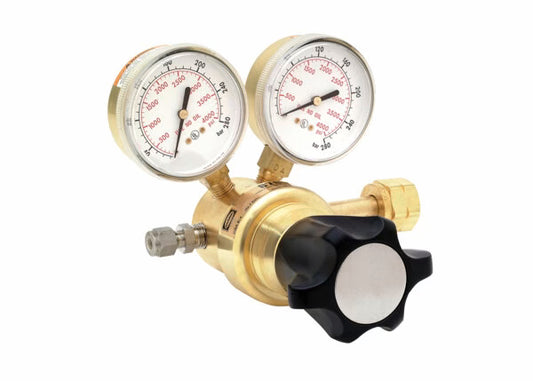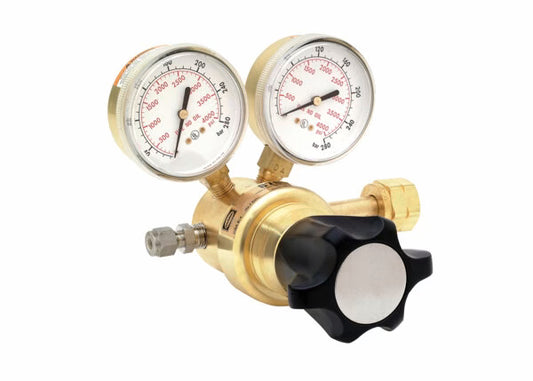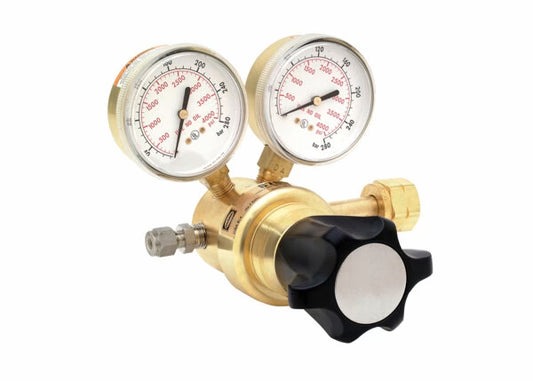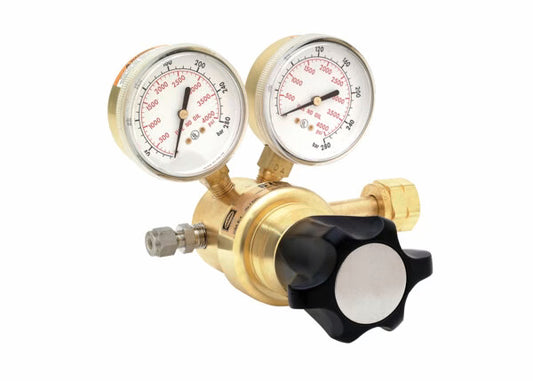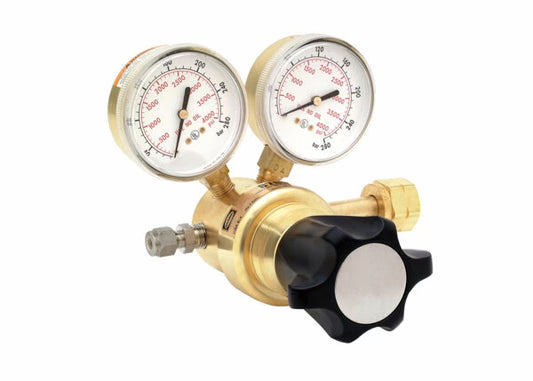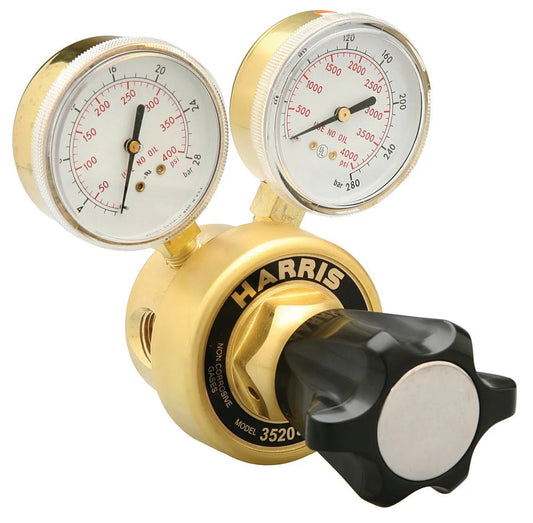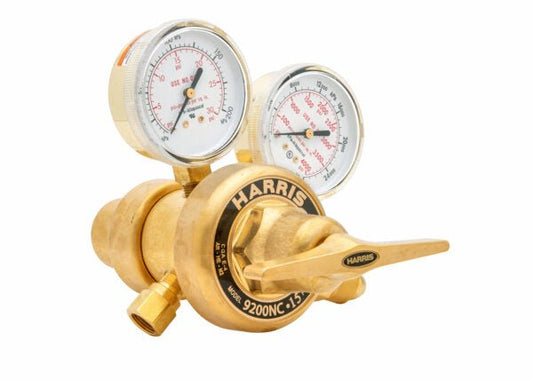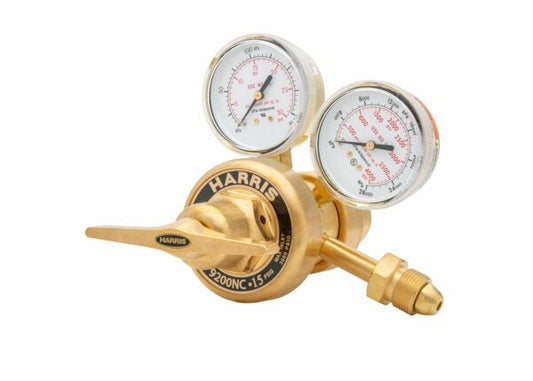What are High Purity Regulators?
High-purity regulators are precision-engineered gas control devices designed to deliver ultra-clean and stable gas flow in critical applications such as welding, laboratory research, semiconductor manufacturing, and medical gas systems. These regulators are built with corrosion-resistant materials like stainless steel and feature specialized diaphragms to prevent contamination, ensuring the integrity of high-purity gases such as argon, nitrogen, helium, and oxygen. By maintaining consistent pressure and minimizing pressure fluctuations, high-purity regulators are essential for applications that demand precise gas control, such as TIG welding, gas chromatography, and pharmaceutical production. Unlike standard gas regulators, high-purity models are designed to prevent diffusion, leaks, and particle contamination, preserving the gas’s purity and performance.
Industries that rely on high-purity gas regulators include aerospace, food and beverage, healthcare, and industrial welding, where precise gas delivery is critical for safety and product quality. These regulators are commonly used in specialty gas systems, ensuring contamination-free gas flow in environments where even the smallest impurities can impact results. Whether for controlled atmosphere welding, high-precision laboratory analysis, or medical oxygen delivery, high-purity regulators help maintain compliance with industry standards such as ISO, CGA, and FDA regulations. Investing in a high-quality gas regulator improves operational efficiency, extends the lifespan of gas delivery systems, and prevents costly gas wastage, making it an essential component of any specialty gas setup.
Beverage
Regulators used in the beverage industry are specialized gas control devices designed to precisely manage the flow and pressure of gases such as CO₂, nitrogen, and argon for beverage carbonation, dispensing, and preservation. CO₂ regulators are the most common, ensuring consistent carbonation levels in soft drinks, beer, and sparkling water, preventing over-foaming or flat beverages. Nitrogen regulators are essential for serving nitrogen-infused drinks like cold brew coffee and stouts, providing a smooth, creamy texture. Argon regulators are often used in wine preservation systems, preventing oxidation and maintaining freshness by displacing oxygen in storage and dispensing systems. These high-precision regulators help maintain beverage quality, ensuring proper pressure control for smooth dispensing and consistent taste.
Beverage gas regulators are crucial for bars, restaurants, breweries, coffee shops, and wineries to optimize beverage presentation, flavor, and efficiency. They feature durable materials like stainless steel or brass, corrosion-resistant coatings, and dual-stage designs for steady pressure control, preventing gas fluctuations that could affect beverage quality. High-quality regulators reduce waste, improve operational efficiency, and ensure compliance with industry standards such as FDA and NSF guidelines. Investing in a reliable gas regulator helps businesses maintain customer satisfaction, reduce maintenance costs, and maximize the performance of their beverage dispensing systems, making them an essential component of any commercial beverage operation.
FAQ's About Specialty Gas
What is specialty gas equipment and why is it important?
How do I choose the right gas regulator for my application?
Selecting the right gas regulator depends on the type of gas, required pressure range, flow rate, and application. High-purity regulators are ideal for laboratory and medical gases, while industrial regulators are suited for welding and manufacturing. Dual-stage regulators provide stable pressure for sensitive applications, while single-stage regulators are effective for less critical processes. Always ensure compatibility with the gas type and industry standards like CGA, ISO, and FDA regulations.
What safety precautions should be taken when using specialty gas equipment?
Proper handling, installation, and maintenance of specialty gas equipment are crucial for safety. Store gas cylinders in a well-ventilated area, use the correct regulator for each gas type, and regularly inspect hoses and fittings for leaks. Pressure relief devices and automatic shutoff valves help prevent accidents, while proper training ensures employees understand gas handling procedures and emergency protocols.
How does a gas manifold system improve efficiency?
Gas purity directly impacts performance in applications such as welding, semiconductor manufacturing, food packaging, and medical treatments. Contaminants in gases can lead to weld defects, inaccurate lab results, compromised food quality, or unsafe medical procedures. High-purity gas regulators, leak-proof connections, and proper storage help maintain gas integrity and ensure consistent, high-quality results.
Featured Products
Specialty Gas
Specialty Gas Equipment: Setup, Usage, and Importance for Various Industries
Specialty gas equipment plays a vital role in industries requiring precise gas delivery, including welding shops, technical schools, bars, and hospitals. Properly designed specialty gas solutions ensure safety, efficiency, and optimal performance, whether for welding applications, beverage dispensing, or medical treatments. The right setup includes high-precision regulators, manifolds, gas mixers, and distribution systems tailored to specific industry needs. Below, we explore how these systems are set up, used, and why they are crucial for different sectors.
Setup of Specialty Gas Equipment
- Gas Source Selection – Depending on the application, specialty gases such as argon, CO₂, nitrogen, oxygen, or mixed gas blends are selected to meet the required purity level.
- Regulators & Manifolds – High-precision gas regulators and manifolds are installed to control pressure and flow, ensuring stable delivery and preventing contamination.
- Gas Distribution System – Tubing, hoses, or piping systems distribute gas safely from cylinders or bulk storage to end-use points. Stainless steel or PTFE-lined tubing is often used for purity-sensitive applications.
- Safety Controls & Monitoring – Automated monitoring systems and safety shut-off valves are integrated to detect leaks, ensure compliance with industry standards, and maintain operational safety.
- Storage & Ventilation – Proper cylinder storage and ventilation setups prevent hazards, meeting OSHA, NFPA, and FDA guidelines based on industry needs.
Usage and Industry-Specific Applications
Welding Shops & Technical Schools
- Gas Used: Argon, helium, CO₂, oxygen, acetylene, and specialty welding gas mixtures.
- Purpose: Specialty gas systems ensure consistent shielding gas flow for MIG, TIG, and stick welding, optimizing weld quality and reducing defects.
- Equipment Setup: Welding stations are equipped with precision regulators, flow meters, and gas distribution panels to manage multiple workstations efficiently.
Bars & Restaurants
- Gas Used: CO₂, nitrogen, argon-CO₂ blends for beverage dispensing and food preservation.
- Purpose: Used for carbonating soft drinks, dispensing beer, and nitrogen-infused beverages like cold brew coffee. Nitrogen also helps preserve wine and food to prevent oxidation.
- Equipment Setup: High-purity gas tanks connect to beverage dispensers via food-grade regulators and tubing, with pressure-controlled systems for smooth beverage flow.
Hospitals & Medical Facilities
- Gas Used: Oxygen, nitrous oxide, medical air, carbon dioxide, helium, and specialty anesthetic gases.
- Purpose: Essential for life support, anesthesia, respiratory therapy, and sterilization processes.
- Equipment Setup: Centralized gas supply systems with high-purity regulators, medical-grade piping, emergency shut-off valves, and monitoring alarms ensure safe delivery to operating rooms, ICU, and patient areas.
Why Well-Designed Specialty Gas Solutions Matter
- Safety Compliance – Proper setup prevents leaks, contamination, and potential health hazards, ensuring OSHA, FDA, and NFPA compliance.
- Operational Efficiency – Precision gas delivery reduces waste, improves performance, and extends equipment lifespan.
- Product Quality & Performance – Inconsistent gas flow can lead to defects in welding, poor beverage carbonation, or medical complications.
- Cost Savings – Optimized gas management systems reduce excessive consumption, lowering long-term operational costs.
A well-designed specialty gas solution is essential for businesses and institutions relying on high-purity gases. Whether it’s improving weld quality, ensuring beverage consistency, or supporting critical medical procedures, having the right gas equipment setup enhances safety, efficiency, and overall performance.










